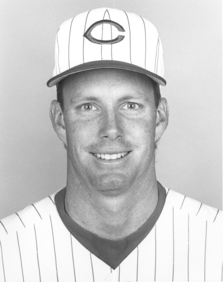Steroids: What If?
As you can imagine, I?ve been asked a lot of "what if" questions lately about baseball and performance enhancing drugs. I wish I had more answers. I do have some juicy personal knowledge of a former Major Leaguer and his encounter with steroids. It just happens to be my own brother, Mike Anderson.
Mike pitched professionally from 1988-1999. He got a ?cup of coffee? with the Reds in 1993 and is probably best known in the baseball history books as the pitcher who gave up two of Mark Whiten?s four homeruns and six of his twelve RBIs on an historic September night in Cincinnati. That was Mike?s Major League debut.
Reds in 1993 and is probably best known in the baseball history books as the pitcher who gave up two of Mark Whiten?s four homeruns and six of his twelve RBIs on an historic September night in Cincinnati. That was Mike?s Major League debut.
You won?t find Mike?s name in the Mitchell Report. He?s never failed a drug test. You won?t find his name on the list of clubhouse attendants, personal trainers or any other individuals associated with the distribution of performance enhancing drugs either. That?s because he’s never done steroids or HGH. He certainly had the chance, though. He said the fear of long term effects performance enhancing drugs would have on his body was sufficient for denial. He wonders what his choice would have been if he had a big league paycheck rolling in every two weeks. He’s just being sympathetic. He didn?t take them in college, he didn?t take them when he was flat broke, and I doubt he would have taken them if he had a fat bankroll.
Mike says he didn?t hold a grudge then and doesn?t now. He signed as a non-drafted free agent after graduating from college. He survived the minor league ladder on the strength of a one thousand dollar signing bonus. Before his MLB debut, he was easily one of the top pitchers on his team and in his league at every stop. Check his minor league stats. As he got closer to the big leagues, the stakes were raised and many he competed with and against began taking PEDs. Suddenly, the ?major league talent? rose to the top and Mike was branded ?quadruple-A? which means he was an above average Triple A pitcher, not quite good enough for the Majors.
What?s interesting about Mike?s career is that he surfaced as a big league prospect at the same time the players strike occurred in 1994. He chose to not cross the line. Instead, he went back to Triple-A and settled for a minor league paycheck. He played in an era when his big league peers demanded he not cross the line for ethical reasons. Then, once the strike ended, a culture existed that encouraged using performance enhancing drugs or run the risk of getting left behind. He didn’t cross the picket line to protect the interest of the players. Then, he didn’t cross the "integrity" line that raised the performance of some of those same players to a level he could not achieve naturally.
Mike now coaches in the game, which means he has to warn his players about the dangers of such shortcuts. In the off-season, he gives pitching lessons to young ballplayers in his hometown. While many current players have kept quiet on the subject, there?s Mike, out there on the front lines having to answer plenty of tough questions lately. Kids are a lot tougher than writers. He tells them a clear conscience makes a soft pillow.
With the exception of 36 days, my brother spent his entire twelve year playing career in the minor leagues and Korea. After his time as a player, he began a professional coaching career and is currently the Assistant Pitching Coordinator with the Texas Rangers. He?s been a coach the last eight years, teaching the craft and helping to produce big league hurlers. That is 20 years, spent mostly on buses in the minor leagues, in professional baseball.
If you want to know who this controversy REALLY affected, pay attention to the ?no names.? Perhaps they are ?no names? because they played it straight. On a level playing field, who knows how comparable his skills would have been. He competed in a sport that was not competed fairly. Now, let?s hope things will be better.
It?s easy to play the ?what if? game. We do it all the time in my family. But, in my opinion, what?s done is done. The truth will eventually come out. It has already started. Besides, I have found a better ?what if? question. What if…Mike Anderson was not the guy face to face with a teenager wanting some answers on performance enhancing drugs? Who would you rather have answering that question, especially if you’re a parent. My bro does not have to say, ?I made a mistake?I shouldn’t have?I did it for injuries?don?t be like me.? He gets the privilege to say, "I didn?t,? ?Be like me!" ?Do what I did.? Period.
As a player, Mike was invited to join the party. He was so close to his dream he could taste it. Yet, he chose integrity. He chose to play it straight and if his God-given talents weren’t good enough, then that’s where it stopped. He barely made a name for himself as a player, but now he’s making a big impact on a whole new generation every day. HE is somebody the game owes something to. He (and many others just like him) is the real hero in this drama.
-BA
Here’s an appropriate tune by request CLICK…and to complete the family ties, my grandma and Spoon-man Britt Daniel’s grandma live in the same apartment complex. She’s an accomplished piano player.
Please feel free to send your thoughts/questions by clicking on the "Comments" icon below.
Photo courtesy of the Reds.